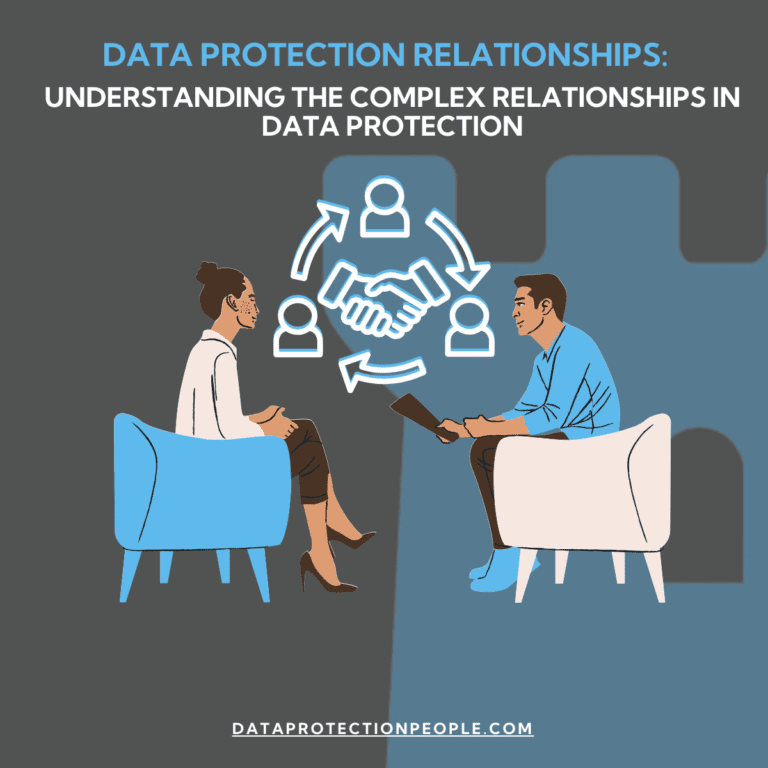Understanding the complex relationships in data protection
Written by Data Protection People
Understand the complex relationships in data protection understand your responsibilities as a data controller, joint controller or processor.

Data Protection Relationships – Understanding the complex relationships in data protection
In the complex landscape of data protection, knowing whether you are a data controller, joint controller, or processor is essential. This clarity ensures that you comply effectively with UK data protection laws.
- Controllers decide how and why personal data is processed.
- Processors handle data on a controller’s behalf, with some responsibilities but fewer compliance obligations than controllers.
- Both controllers and processors must meet specific legal standards. The Information Commissioner’s Office (ICO) empowered to act against both parties for breaches.
For organisations, particularly in fields like political campaigns, understanding these roles is critical, as responsibilities can vary significantly depending on the structure and purpose of data usage.
Understanding Key Roles in Data Protection
1. Controllers, Joint Controllers, and Processors Defined
- Controllers are decision-makers, determining the purposes and methods of processing personal data. If multiple controllers share control of the same data for the same purposes, they are considered joint controllers. However, they are not joint controllers if they use the same data for different purposes.
- Processors act solely on the controller’s instructions, handling data without determining its purpose. They are responsible for aspects like data security and breach notification but do not have as comprehensive compliance obligations as controllers.
Both roles are essential under UK GDPR, and the ICO can enforce penalties against both controllers and processors for non-compliance.
2. Data Controllership in Political Campaigns In political campaigns, controllership roles can vary significantly due to the diverse structures and legal arrangements among political parties, campaign groups, and elected representatives. For example:
- Political parties might have separate data controllership roles at the national and local levels.
- Individual candidates or elected representatives may act as controllers independently for activities like constituency work.
Political candidates, campaign groups, and political parties can access the electoral register, each serving as a controller for this data. Any data sharing between elected representatives and party offices requires careful consideration to meet UK GDPR standards, ensuring compliance in all data handling activities.
3. Real-World Controllership Examples in Campaigning
- Example 1: An independent candidate in a local election compiles a list of supporters and contracts a company to send campaign letters. Here, the candidate is the controller, deciding the purpose and method (sending letters to encourage voting), while the company acts as a processor, executing the task per the candidate’s instructions.
- Example 2: A political party engages a research company to conduct voter modelling. The party specifies the desired outcome but leaves the methodology to the research firm, which means both the party and the firm become joint controllers, jointly determining aspects of data processing while retaining distinct responsibilities.
Identifying and Defining Data Controllership in Practice
For effective GDPR compliance, organisations should clearly identify who controls each data set and under what circumstances. Mapping data flows and documenting which organisations are responsible for which data can be useful steps. It’s essential to clarify whether data is processed for a shared purpose or not, as this distinction affects the type of relationship (controller vs. joint controller) and compliance obligations.
For more information on mapping and documenting controllership relationships, consider completing a Data Protection Impact Assessment (DPIA).
Establishing and Managing Data Protection Relationships
After determining if you are a controller, joint controller, or processor, it’s crucial to formalise each relationship according to UK GDPR standards:
- Controller and Processor: This relationship requires a written contract. It needs to outline the processor’s duties and binding them to act solely on the controller’s instructions.
- Joint Controllers: These arrangements require a transparent agreement outlining each party’s responsibilities under GDPR, even though no formal contract is mandated.
For organisations in politically sensitive areas, it’s also important to remember that the public may not fully understand the nuances of these roles. Ensuring clear and accessible ways for individuals to exercise their data rights can prevent misunderstandings and enhance trust.
The Data Protection Fee
Under the Data Protection (Charges and Information) Regulations 2018, most controllers processing personal data are required to pay a data protection fee to the ICO. There are exceptions for elected representatives, prospective representatives, and House of Lords members. Most political parties and campaign groups, however, are required to pay this fee. Visit the ICO website for full details on payment and exemptions.
By understanding the complex relationships in data protection and documenting your role you can ensure compliance with data protection regulations. Particularly under complex arrangements like political campaigns. Following these best practices enhances accountability, transparency, and compliance with data protection laws. This helps you manage data responsibly and maintain trust with the public.
How Data Protection People Can Help
At Data Protection People, we make data protection simple. Our expert team clarifies your role and responsibilities, ensuring GDPR compliance even in complex setups like political campaigns. With tailored training, audits, and assessments, we help keep your organisation fully compliant. Get in touch today to make data protection easy.
